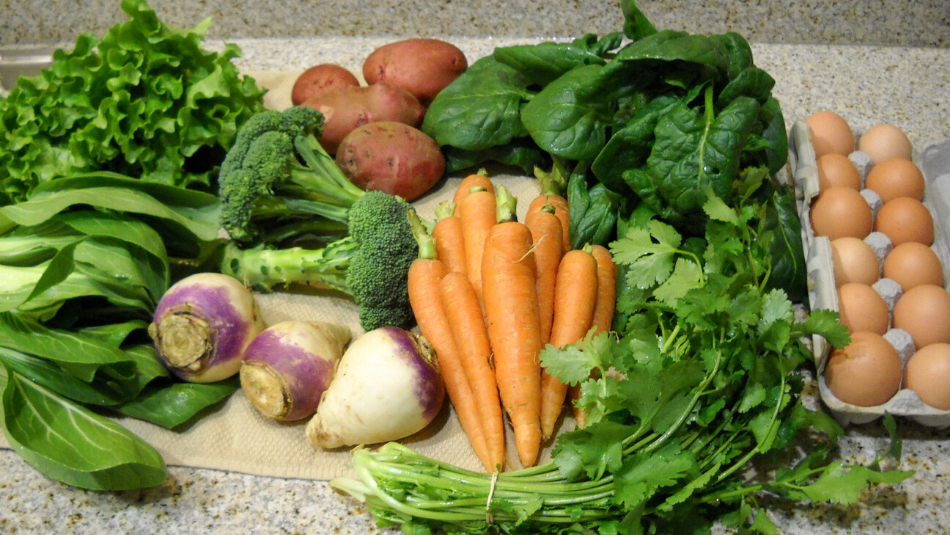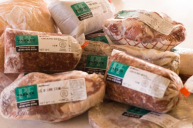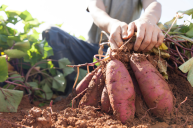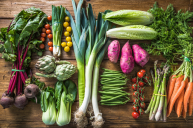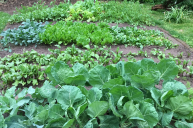Community supported agriculture, or CSA, is an amazing way to buy high quality, often organic, vegetables and fruit in addition to directly supporting local farmers and sustainable agriculture. Should you join a CSA? As great as they are, because a CSA operates according to a specific model, it's not for everyone.
If you're interested in becoming a new member of a farm's CSA, the first thing to do is see if there's one near you. Local Harvest has a good list or you might check your local paper to see if they keep a database of local CSA farms across America. Then read through to see the cost, what you get as part of your share, and where pickup spots. Read on for more advice on if joining a CSA is right for you.
What, exactly, is a CSA?
CSAs are, basically, subscription-based services. Your subscription covers a share, or portion, of a local farm's output. When you join a CSA, you generally pay a lump sum at the beginning of a season for a certain number of weeks where you receive a box of farm fresh produce.
The concept started in Japan in the 1960s by a group of women concerned about pesticides and the increase of processed and imported food. The first CSA in North America was created in 1984 in Massachusetts. There are over 2,500 CSAs in the USA today, though it's harder to find them in areas that don't have a strong small farm presence.
Some CSA shares offer vegetables only, some offer additional fresh food like fruit, eggs, honey, or other farm products. There are a few farms that offer shares with local foods like meat, bread, and cheese. Depending on where you live, some farms and producers may band together to offer a larger variety of items and then split the fee you pay for your CSA box.
More and more farms are offering half shares or mini shares, so if you're considering a share for you or you and one other person, check to see if the CSA sells smaller shares. Some farms are also offering a winter share, where you might get winter vegetables like kale and other greens that like cold weather, plus items that store well like winter squash, cabbage, and carrots.
CSA generally operate with a weekly delivery, usually to a central pick up location. Some CSA programs have your box already put together, a few have a set up that allows you to go through and pick out your own seasonal produce based on a formula (this week you get two cucumbers, five tomatoes, one head of garlic, and six squash). For almost all CSA memberships, you get what you get; there's no customization of the boxes' contents.
Why a CSA is good for farmers
https://www.instagram.com/p/CA09lqxlTT8/
For the farmer, the CSA model provides certainty and money they can use immediately to help produce that season's harvest.
Farming is notoriously unpredictable. A late freeze can wipe out a peach crop while early warmth brings strawberries in March. There's also uncertainty around how much the farmer will be able to sell in any growing season. Maybe they're big enough to have a contract with a grocery store, or maybe they rely on farmers markets or an on-site produce stand, which means they don't know exactly much they will sell, so they don't know how much to grow.
CSA farmers know how many customers they will have in a given season by counting the number of CSA members they have. Basically, they've already sold all of their produce before they plant it. That knowledge gives them certainty so they can focus on their work and not on financial unpredictability. If you want to help out your local farmers, joining a CSA is a great way to do that.
Advantages of joining a CSA
For you, a buyer of fresh, healthy foods, there are great advantages to joining a CSA. First and foremost, you get produce straight from the field every week. There's no going to the grocery store and wondering where that carrot came from.
There's also financial certainty for you as a customer. You already know how much you've spent on food for a set amount of time, so you can tweak the rest of your food budget based on that knowledge.
Because you don't always know what you're going to get, a CSA box can generate creativity. If you like to experiment in the kitchen with new veggies, a CSA box can a weekly source of inspiration. It can also be a way to get into food preservation; if you get a lot of cucumbers, you can try your hand at pickles, for example.
Disadvantages of joining a CSA
Joining a CSA requires a bit of upfront investment, which not everyone can do. Some farms have payment plans and a few offer a way for community members to trade work on the farm for produce, but the cost of a CSA can be a deterrent.
It's said that late summer is the only time people lock their cars at church, not because they're afraid of the car being stolen, but because someone is probably going to put zucchini in them. Because you own a share of the farm's output, when the farmer has a good season, so do you. If dealing with 15 zucchini each week for three weeks is not your idea of a good time, a CSA might not be the right option for you.
And because you don't control what's in your weekly share, if you're a picky eater you might end up with a lot of food you don't want, which leads to food waste and wasted money.
If you travel a lot, a CSA might be hard to keep up with. Because of the seasonal and perishable nature of the product, it's basically impossible for the farmer to keep your box until next week. And while some farmers might be able to let you make up for a missed box the next week, because the boxes depend on that week's output, generally speaking, if you get more, someone else gets less.
Whatever you decide, supporting local agriculture is good. If not by joining a CSA, find your local farmers market and get to know the people who grow your food.
This article was originally published on June 4, 2018.
